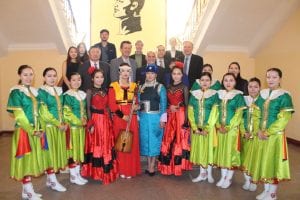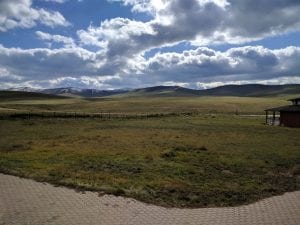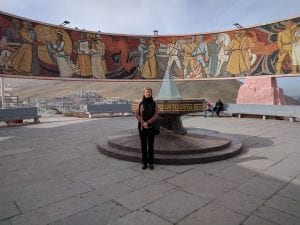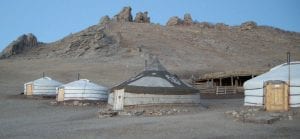American Center for Mongolian Studies
American Center for Mongolian Studies is a private, not-for-profit educational organization offering exchanges and academic programs in Mongolia and Inner Asia. From its offices in Ulaanbaatar, ACMS assists scholars working in a wide variety of academic disciplines related to Mongolia, sponsors Mongolian Studies events in North America, supports field researc h and academic exchange fellowships, and hosts public events and academic presentations. ACMS offers pre- and post-arrival services to aid students and scholars with their visit to Mongolia, assistance to institutions with academic conference planning, and group tours to help faculty, students, and others learn more about Mongolia. In an effort to connect researchers across academic disciplines, ACMS also has maintained the Mongolia Research Registry, which collected and disseminated information about individuals and organizations engaged in scholarship on Mongolia. Its Mongolia Field Notes concise online publication connects the work of international and Mongolian researchers with issues in present-day Mongolia.
h and academic exchange fellowships, and hosts public events and academic presentations. ACMS offers pre- and post-arrival services to aid students and scholars with their visit to Mongolia, assistance to institutions with academic conference planning, and group tours to help faculty, students, and others learn more about Mongolia. In an effort to connect researchers across academic disciplines, ACMS also has maintained the Mongolia Research Registry, which collected and disseminated information about individuals and organizations engaged in scholarship on Mongolia. Its Mongolia Field Notes concise online publication connects the work of international and Mongolian researchers with issues in present-day Mongolia.
EducationUSA
EducationUSA is a U.S. State Department network of international student advising centers that promote U.S. higher education to students wishing to study at accredited postsecondary institutions in the United States. EducationUSA Mongolia offers an advising center in the Ulaanbaatar Public Library.
Embassy of Mongolia to the United States
Embassy of Mongolia to the United States and Mongolian Cultural Center in Washingto n, DC host an annual Mongolian Studies Conference on research topics relevant to Mongolian Studies, including social, economic, and cultural issues. Papers should be original works and can be written and presented in English or Mongolian. The Mongolian Embassy provides travel visas to U.S. citizens wishing to travel to Mongolia for more than ninety days.
n, DC host an annual Mongolian Studies Conference on research topics relevant to Mongolian Studies, including social, economic, and cultural issues. Papers should be original works and can be written and presented in English or Mongolian. The Mongolian Embassy provides travel visas to U.S. citizens wishing to travel to Mongolia for more than ninety days.
The Institute for Mongolian Studies
The Institute for Mongolian Studies (IMS) at National University of Mongolia is the world’s leading organization for initiating and supporting research about Mongolia at the national, regional, and international levels. It was first established in 2000 as the Centre for Mongol Studies and changed its name in 2011 to the Institute for Mongolian Studies. The IMS serves as a funding agency, resource center think tank, archive, and clearinghouse for research on all disciplines related to Mongolia. The IMS advances knowledge and understanding of Mongolian cultures and regions across all time periods. This is accomplished by supporting Mongolian Studies at academic institutions in Mongolia and abroad.
The IMS provides both direct and indirect support for research on Mongolia. This includes research and pilot project grants, short-term salary support for established researchers to initiate or complete projects, seed money for researchers-in-training, and funding for international conferences. IMS also maintains a research library in Mongolian, Chinese, Russian, Korean, Japanese, Ma nchu, English, German, and French, and it provides access to research resources in Mongolia. The institute fosters collaborative ties between researchers, offers in-country office space and logistical assistance, advances training in the Mongolian language and script, and it helps publish research results.
nchu, English, German, and French, and it provides access to research resources in Mongolia. The institute fosters collaborative ties between researchers, offers in-country office space and logistical assistance, advances training in the Mongolian language and script, and it helps publish research results.
The Institute’s primary objectives are to develop, lead, and direct Mongolian Studies within the National University of Mongolia; to manage, connect, plan, and provide information to organizations, research centers, and researchers working in fields related to Mongolian studies; and to implement national and international projects and support Mongolian Studies in foreign countries. Over the past ten years, IMS has focused on developing textual, artifactual, scriptural, and historical Mongolian language studies. In the coming years, IMS plans to broaden its scope to focus on studying and developing history, literature, religion, ethnic studies, law, traditional knowledge, economics, politics, anthropology and art.
In addition, IMS has been working to increase the number and quality of publications and scholarly journals, such as Acta Mongolica, which is edited and run by well-known researchers from both Mongolian and foreign universities.
The International Association for Mongol Studies
The International Association for Mongol Studies (IAMS) is an internationally recognized organization that promotes Mongolian Studies worldwide, publishes scholarly journals and collections, and organizes workshops and meetings. First established in 1970 as the Standing Committee of the International Congress of Mongolists, in 1987 the International Association for Mongol Studies was permanently created by representatives of thirty-six countries and four international organizations. The IAMS’s Secretariat, structure, funding, and budget were passed by the Council of Ministers of the Mongolian People’s Republic in 1988. More recently, the IAMS Congress has defined the association’s activities.
IAMS promotes Mongolian Studies internationally and disseminates a variety of publications, including News Information Mongol Studies, the international journal Mongolica, and scholarship produced by foreign and local Mongolists. The IAMS Secretariat hosts Mongolists from around the globe, supports their research activities within Mongolia, and provides funding  assistance. IAMS Secretariat also organizes and manages the International Congress of Mongolists, which is held once every five years. The IAMS Secretariat, in recent years, also has implemented the National Program of Promoting Mongol Studies.
assistance. IAMS Secretariat also organizes and manages the International Congress of Mongolists, which is held once every five years. The IAMS Secretariat, in recent years, also has implemented the National Program of Promoting Mongol Studies.
Today, IAMS has approximately 100 local and 400 international members. The organization also collaborates with more than 40 Mongolian Studies centers in other countries, sharing IAMS publications as well as the latest information in Mongolian Studies.
The Mongolia Society
The Mongolia Society, a private non-profit educational organization established in 1961, promotes the study of Mongolian history, culture, and language. The Society publishes several periodicals, including the peer-reviewed journal Mongolian Studies: Journal of the Mongolian Society and a newsletter containing a range of topics related to Mongolia, available to its members and other subscribers. Occasional and special papers of scholarly interest, printed and reprinted dictionaries and learning aids, and other Mongolian Studies publications are also available from the Society website. The Mongolia Society also maintains a list of scholars involved in Mongolian Studies and hosts events and an annual conference.
University of Cambridge
University of Cambridge is home to the Mongolia and Inner Asia Studies Unit, an interdisciplinary research center established in 1986 and based in the Department of Social Anthropology. MIASU trains and supports students from Inner Asia and connects scholars engaged in a variety of research projects related to the region.
U.S. Embassy in Mongolia
U.S. Embassy in Mongolia supports the needs of U.S. citizens studying in Mongolia, including emergency assistance, passports and citizenship matters, local resources, and help with federal programs. The embassy conducts and facilitates cultural exchange and educational programs. For example, Study in the U.S.A., offers hundreds of Mongolian students an opportunity to attend higher education colleges and universities in the U.S. The embassy’s local grant program awards a limited number of grants to non-governmental organizations, academic institutions, and individuals to support educational, cultural, artistic, and other projects that advance cultural understanding between the U.S. and Mongolia and build connections between people.

Western Washington University
Western Washington University East Asian Studies Press, in partnership with the Western Libraries, provides open access to books related to Mongolia in its two series: Studies on East Asia, and East Asian Research Aids and Translations. Titles include Mongolian Short Stories (1974), Bibliotheca Mongolica (1978), Studies on Mongolia (1979), Nicholas Poppe’s autobiography Reminiscences (1983), Mongolian Publications at Western Washington University (1984), The Minorities of Northern China (1984), Mongolia and the Mongols: Holdings at Western Washington University (1992), An Uyghur English Dictionary (1993), the English edition of Bazaryn Shirendev’s autobiography Through the Ocean Waves (1998), The Last Mongol Prince: The Life and Times of Demchugdongrub, 1902-1966 (2000), Mongolian Historical Writing from 1200 to 1700 (2002), Mongolian Culture and Society in the Age of Globalization (2006), and Subjects and Masters: Uyghurs in the Mongol Empire (2007).